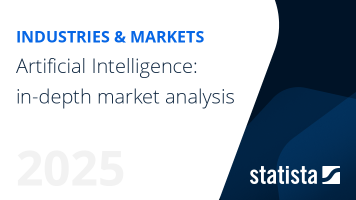Machine Learning - Egypt
Egypt- The market size in the Machine Learning market is projected to reach US$488.26m in 2025.
- The market size is expected to show an annual growth rate (CAGR 2025-2031) of 32.08%, resulting in a market volume of US$2.59bn by 2031.
- In global comparison, the largest market size will be United States (US$30.62bn in 2025).
Definition:
Machine learning is a branch of artificial intelligence that involves the use of algorithms and statistical models to enable computer systems to learn from data and improve their performance on a task. It has a wide range of applications, including image and speech recognition, natural language processing, and predictive analytics. The Machine Learning market includes software platforms, tools, and services that enable organizations to develop and deploy machine learning applications.
Additional Information:
The Machine Learning market comprises two key performance indicators: market sizes, and market sizes by industry. Market sizes are generated by the funding amount of Artificial Intelligence (AI) companies. Key players of the market include companies such as Amazon Web Services (AWS), Google Cloud Platform (GCP), and Microsoft Azure.
For more information on the data displayed, use the info button right next to the boxes.
- Supervised learning applications that require training data, such as image classification
- Unsupervised learning applications that do not need training data, such as clustering and anomaly detection
- Reinforcement learning applications that involve learning through trial and error, such as game playing, robotics, and autonomous driving.
- Traditional programming tools, such as rule-based systems and algorithmic programming
- Statistical analysis tools, such as regression analysis and hypothesis testing
- Non-technical applications, such as financial analysis and business management.








